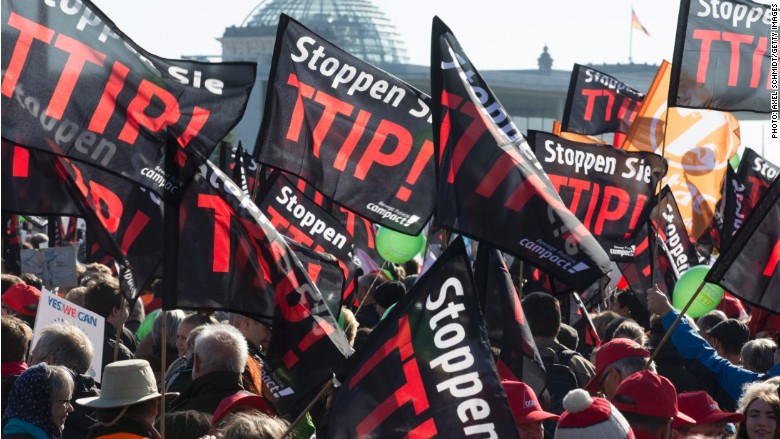
A planned free trade area spanning Europe and the U.S. is supposed to make everyone richer and create lots of jobs. So why is it proving so unpopular?
The Trans-Atlantic Trade and Investment Partnership, or TTIP, would cover more than half of the world's economic output and 800 million people.
Talks began in June 2013, and will resume in Miami on Monday. Having just struck a deal with 11 countries on a Pacific free trade zone, President Obama wants to wrap up negotiations with Europe before he leaves office.
Supporters say the deal will facilitate trade between the world's two biggest economic blocs and create more than a million jobs. The European Commission says it would be worth 545 euros ($620) to each European citizen every year.
Yet nearly 3.5 million Europeans have already signed a petition against the deal, and hundreds of thousands marched in Berlin Sunday to voice their objections.
Here's why people hate it:
1. Secrecy
Opponents are furious that the talks are being held in secret. The draft deal has been kept under wraps -- which in itself is not unusual for big trade agreements.
Both sides say they are being as transparent as possible, but campaigners argue that without the draft being made public, they have little chance to influence the final outcome. They're angry that some big companies are being given more of the detail, and thus have a chance to shape the deal according to their needs.
WikiLeaks has offered a reward worth 100,000 euros ($114,000) for the TTIP documents.
2. More power for business
European labor unions and pressure groups argue the deal will give too much power to big U.S. corporations.
TTIP could make it easier for them to sue governments over laws they claim hurt their business. Critics say this could unleash a wave of attacks on environmental and public health protections, and allow corporations to bypass traditional judicial systems.
They're worried about secretive arbitration tribunals overruling elected governments, and cite as examples Philip Morris' (PM) suit against Australia over plain packaging laws on cigarettes, and Swedish energy company Vattenfall's action against Germany over its decision to phase out nuclear power.
Europe says it doesn't want the agreement to include these powers, and is pushing for a reform of the existing international tribunal system, but it's unclear at this stage whether the U.S. will compromise on that point.
Related: Trans-Pacific trade pact is done, finally
3. Public sector
Europeans love their public services like healthcare, education, and transport.
They're worried that opening these sectors to U.S. companies could lead to more privatization. The European Commission says these sectors will not be included in the agreement, but leaks from the negotiations suggest the U.S. is pushing hard for access.
4. Health and safety
The deal seeks to remove trade barriers and make regulations on both sides of the Atlantic more compatible. But many in Europe are worried that could lead to a softening of Europe's existing regulations on food safety and environmental protection, which are often a lot stricter than in the U.S.
Activists claim TTIP could dilute Europe's strict rules on genetically modified foods and pesticides, and reverse bans on some chemicals in cosmetics.
5. Jobs could move
Unions say the deal could lead to job losses in Europe, because companies might be tempted to move work to the U.S. because of more relaxed labor laws. Increased competition could also lead to job losses in some sectors.
European officials argue that more trade means more jobs, even if some are moved from one industry to another.


